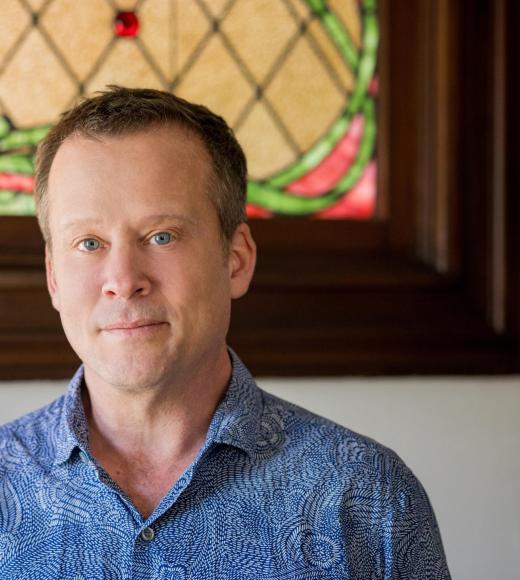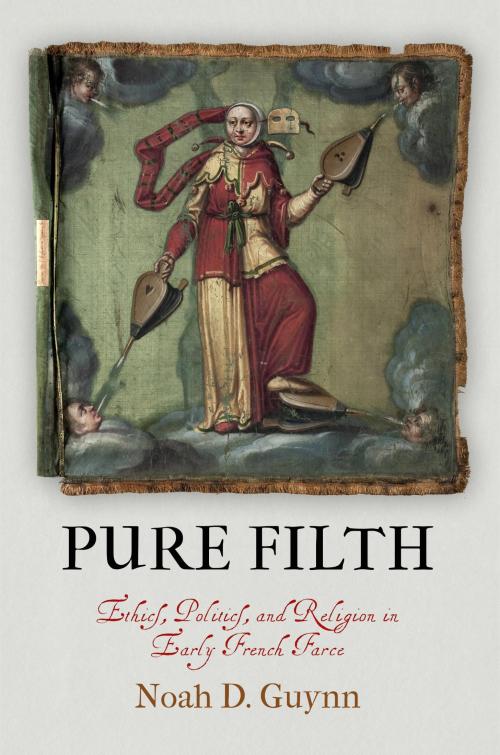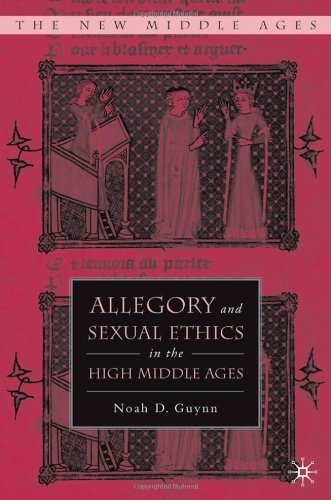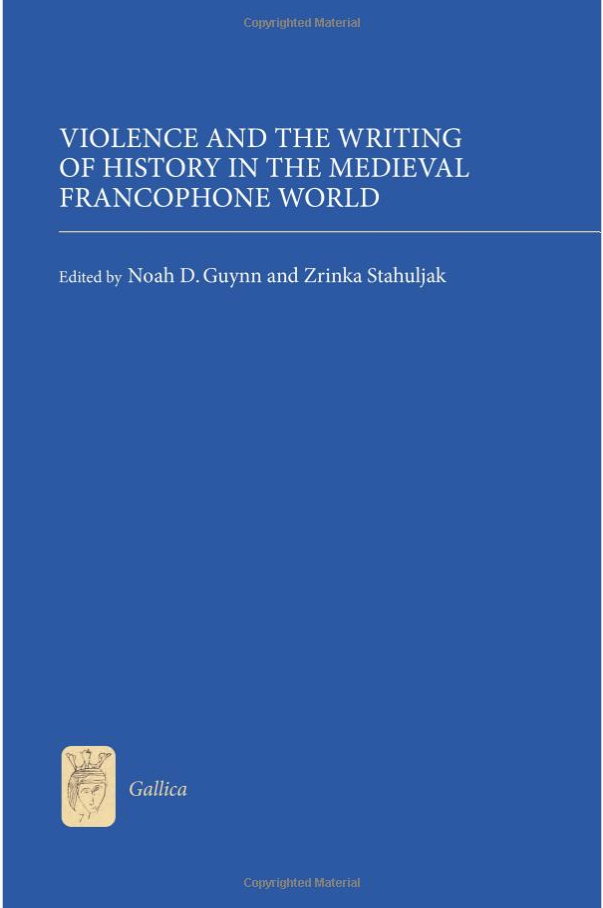
Position Title
Professor of French & Comparative Literature
Associate Dean of Faculty for Humanities, Arts, and Cultural Studies
9/30 reschedule 12:00-1:00 PM
10/2 reschedule 12:00-1:00 PM
11/6 reschedule 4:30-5:30 PM




Bio
Noah Guynn is a specialist in medieval and early modern literature, theater, and culture. His first book, Allegory and Sexual Ethics in the High Middle Ages, was published in The New Middle Ages Series at Palgrave Macmillan in 2007. His second book, Pure Filth: Ethics, Politics, and Religion in Early French Farce, appeared in 2020 in The Middle Ages Series at the University of Pennsylvania Press. Guynn is also coeditor, with David F. Hult (UC Berkeley) and Elizabeth Scala (UT Austin), of Verginia, Lucretia, and the Medieval Livy; with Marilynn Desmond (Binghamton University), of a special issue of Romanic Review titled Category Crossings: Bruno Latour and the Middle Ages; and with Zrinka Stahuljak (UCLA), of an edited volume entitled Violence and the Writing of History in the Medieval Francophone World.
Teaching Experience
Undergraduate Elective: This course will examine gender history as it might be told from the margins. Our focus will be on real people and fictional characters who deviated from social expectations in the shapes and features of their bodies, the ways they dressed, the ways they performed their gender identity, and/or the ways they expressed their sexual desires. The first part of the course will focus on works of medieval and early modern literature and theater that exhibit tremendous flexibility in their conception of gender roles. Among other things, we will deal with transgender knights, female monks, boy actresses, same-sex marriages, and masculine pregnancies. In the second part of the course, we will turn our attention to the nineteenth, twentieth, and twenty-first centuries, looking at the ways in which modern, binary notions of sexual difference have been imagined and enforced but also at the ways in which individuals have claimed alternative identities by refusing gender dimorphism. We will read a famous short story by Balzac about a castrato, a male singer who was castrated in childhood so he would retain a soprano voice in adulthood; and the memoirs of Herculine Barbin, a nineteenth-century "hermaphrodite" whose birthday is now observed as Intersex Solidarity Day. Finally, we will end the quarter with a discussion of two contemporary films, Ma vie en rose (1997) and Tomboy (2011), both of which tell the stories of prepubescent children whose culturally assigned gender differs from their self-identified gender. Throughout the quarter, and especially with these two films, we will consider how families, communities, and societies can work to humanize and/or dehumanize individuals who fail or refuse to conform to prevailing norms.
Graduate Seminar: Since 1975, when Natalie Zemon Davis published her landmark essay “Women on Top,” feminists have focused a great deal of attention on the many abrasive, defiant, self-assertive female characters to be found in outwardly sexist forms of literary, theatrical, visual, and ritual culture. There has been good reason for them to do so, as these Women on Top offer a privileged vantage point from which we may observe the contested, dynamic nature of patriarchy. While aesthetic depictions of shrews, scolds, gossips, and fishwives were clearly used to legitimize the subjection of real women, they also alert us to the fact that patriarchy is not an absolute, inflexible, or unchanging system of hegemonic control but is instead a moving equilibrium structured around a variety of negotiated, oppositional relations. Unfortunately, in our rush to revalue these Women on Top and bring to light the cultural and political tensions surrounding them, we have tended to neglect their more obedient but equally provocative sisters: Bossy Bottoms who manage to unsettle patriarchal ideologies by deliberately and ostentatiously choosing to subordinate themselves to a masculinist agenda. This seminar will focus on both of these character types, perceiving them as manifestations of the transactional and unstable nature of medieval and early modern marriage.
Graduate Seminar: According to philosopher Simon Critchley, “Jokes tear holes in our usual predictions about the empirical world. We might say that humor is produced by a disjunction between the way things are and the way they are represented in the joke, between expectation and actuality. Humor defeats our expectations by producing a novel actuality, by changing the situation in which we find ourselves.” This course will explore the relevance of Critchley’s insight for the study of medieval and early modern comedy, including a range of narrative and theatrical genres. We will focus our attention on how these texts use humor to tear holes in the world, begging questions about what is real, how reality has been constructed for us, and how it might change in response to our laughter. We will do our best not to forget that laughter is a pleasurable, bodily experience, one that is fundamentally at odds with philosophical explanation. That said, we will regularly supplement our literary readings with theoretical expositions on laughter and the body, including key works of critical theory, political anthropology, and feminist and queer studies. Of particular interest will be the problem of subalterns as the butt of jokes, and the ways in which subaltern characters respond to being targeted. As we will find, the response often involves turning a joke on its head, tearing holes in reality, and imagining “a novel actuality” in which subordination is neither natural nor necessary nor justified.
Graduate Seminar: The marriage plot, ubiquitous in Western literature since the Greeks, may seem absurdly formulaic. It centers on the courtship rituals of a young heterosexual couple and achieves fictional closure only by removing all obstacles to marriage. The typical “happily ever after” ending is ideological in the extreme, construing happiness as compulsory heterosexuality, submissive femininity, reproductive futurity, and class determinism. And yet as we will discover in this seminar, early modern French authors working in genres like comedy and fairy tale often manage to adhere to the marriage plot while challenging its ideological underpinnings. Some texts arrive at their happy ending in the expected way, by establishing a conventional household formation; yet they leave us to wonder whether happiness will be truly enduring and shared or whether domestic bliss will be threatened from within. Other texts embrace an oppositional politics, whether by establishing an unconventional (femdom, queer, trans) household and happiness or by embracing an anti-matrimonial polemic (happiness as the avoidance of marriage). The syllabus includes works by Corneille, Molière, Mme. de Villedieu, Mme. d’Aulnoy, Perrault, l’Abbé de Choisy, and la Duchesse de Montpensier.
Education and Degree(s)
- Ph.D., M.Phil., M.A., Yale University
- B.A., Haverford College
Honors and Awards
- American Council of Learned Societies Fellowship, 2012–13
- Phi Beta Kappa Excellence in Teaching Award, 2009
- Martin Stevens Award for the Best New Article in Early Drama Studies, Medieval and Renaissance Drama Society, 2007
Research Interests & Expertise
- Medieval and Early Modern Literature and Drama
- Critical, Feminist, and Queer Theories
- Performance Studies and Theater History
Publications
- Verginia and Lucretia: An Edition and Translation of Episodes from Bersuire’s “Tite-Live” and Jean de Meun’s “Roman de la rose”. Coauthored with David F. Hult (UC Berkeley) and Elizabeth Scala (UT Austin). Under review at Boydell & Brewer.
- “The Real Housewives of Medieval France: Feminism, Domestic Drama, and the History of the Household.” In Historians on Housewives, ed. Kacey Calamine, Jessica Millward, and Max Speare. Forthcoming with University of North Carolina Press.
- “Binocular Vision: Enchantment and Disenchantment, Metaphysics and Phenomenology on the Late Medieval Stage,” in Category Crossings: Bruno Latour and the Middle Ages. Special issue of Romanic Review, forthcoming.
- “We Have Always Been Medieval: Bruno Latour and Double Click, Metaphysics and Modernity,” in Category Crossings: Bruno Latour and the Middle Ages. Special issue of Romanic Review, forthcoming. Coauthored with Marilynn Desmond (Binghamton University).
- “Translating Catharsis: Aristotle and Averroës, the Scholastics and the Basochiens,” in Rethinking Medieval Translation: Ethics, Politics, Theory, ed. Emma Campbell and Robert Mills. Woodbridge, UK: Boydell & Brewer, 2012.
- “Hybridity, Gender, and Ethics in Two Old French Werewolf Tales,” in Stones, Worms, and Skin: Gender and Embodiment in Medieval Europe, ed. E. Jane Burns and Peggy McCracken. South Bend: Notre Dame University Press, 2012.
- “Rhetoric and Historiography in Villehardouin’s Conquest of Constantinople,” in The Cambridge History of French Literature, ed. William Burgwinkle, Nick Hammond, and Emma Wilson. Cambridge, UK: Cambridge University Press, 2011.
Membership and Service
- Member, Editorial Board, Speculum: A Journal of Medieval Studies
- Member, Advisory Board, Exemplaria: Medieval / Early Modern / Theory
- Member, Advisory Board, Romanic Review
